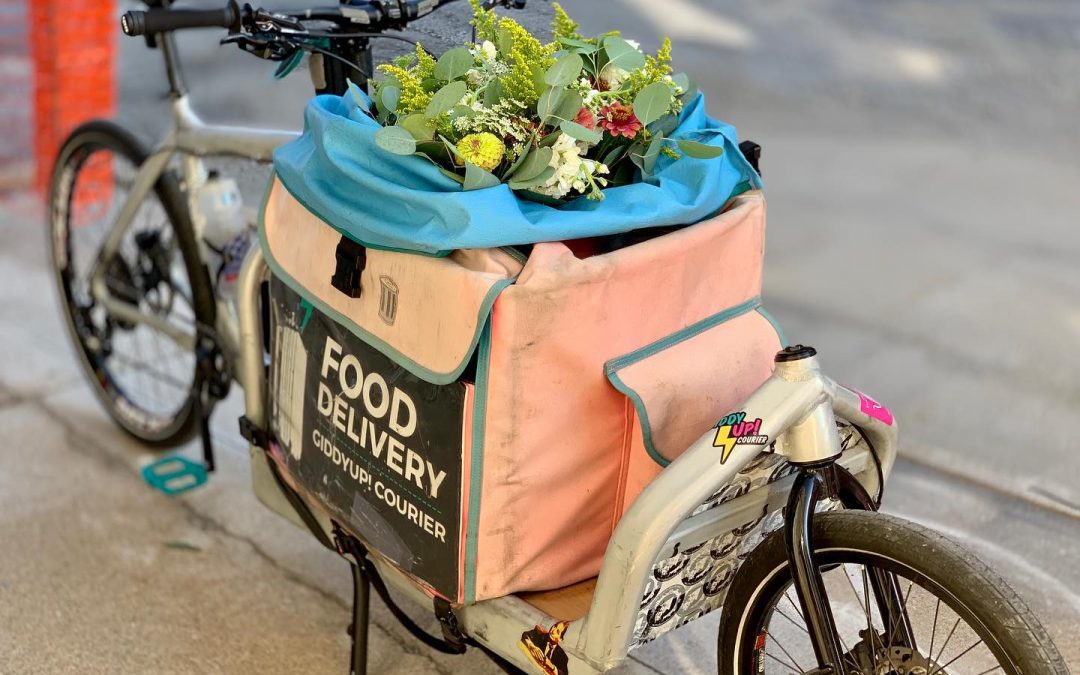There are noble souls who insist that time stuck in traffic doesn’t bother them. That they can blissfully enjoy the time listening to podcasts. These are annoying people. For the rest of us, it’s aggravating. And for restaurants, it’s money lost.
The 2023 Global Traffic Scorecard report by INRIX, a transportation analytics company, found that the U.S. lost more than $70.4 billion last year due to traffic congestion, a 15 percent increase from 2022.
A solution for restaurants with off-premises operations? Cargo bikes. More and more, restaurants are turning to delivery people who use them. Cycle lanes are one reason. While the rest of us are mired hopelessly in a turn lane, cyclists breeze on by. And with a cargo bike, there’s space for more than one order. Drop off one, on to the next.

Nick Waite, owner of Giddy Up! Courier
Nick Waite has run Giddy Up! Courier, a bicycle food-delivery business in the Shenandoah Valley of Virginia, since 2016. He comes to his expertise with some serious bona fides, having made his living for years as a racer with the KBS/Medifast Pro Cycling team. He finds cargo bikes handy for catering orders.
“When a restaurant or deli says, We’ve got 75 sandwiches and salads and they’re all packed in, they’re great,” he said. “It’s good to have them in a front load rather than a big platform behind you.”
That’s great you have the calves to power the weight, like Waite does. But if you don’t, and let’s be real, you don’t, an electric cargo bike, which can travel up to 15 mph with minimal pedal assistance, might be easier. But that would be a sizable investment. The average cost of an eCargo bike is around $5,000, according to a white paper published by Portland State University. That’s not nothing. But compared to a vehicle, the economics get friendlier, in particular with long-term expenses like fuel, maintenance, and repairs.
Electric Cargo Bikes Are a Thing in Stockholm

Bill Wachtel, chairman of Fernhay Solutions
In Europe, one already sees eCargo bikes pretty regularly, says Bill Wachtel, who is the chairman of Fernhay Solutions, which manufacturers them, including the eQuad, which is designed for commercial applications, including last-mile parcel delivery. The bike produces zero emissions and can fit in narrower spaces on city streets than a van or truck could, even with cargo space of up to 75 cubic feet.
“London, Paris, Stockholm, they’re popular there,” he said, “but the United States is moving at a snail’s pace. The challenge is to move people to having a bike mentality.”
Rebates May Be Available
There are some regions that are offering incentives to get eCargo bikes on the streets. Vermont is offering a $2,500 incentive to municipalities, businesses, and nonprofit organizations to purchase eCargo bikes. California is considering $1,750. Washington, D.C. $700. Colorado $300.
In Canada, British Columbia and Prince Edward Island have subsidy programs, awarding from $400 to $1,365. One company up north that has been crushing it is SPUD.ca, a Vancouver grocery delivery company specializing in organic products. It has reported a reduction in delivery costs and a decrease in delivery time per order using electric bikes.
We’re not going to see cargo bikes or electric bikes supplant automotive delivery any time soon. But if sustainability is part of your mission, the fact that you could use one now, and perhaps get a kickback from the government, is something. Wachtel thinks the trend will grow.
“Attitudes are starting to change. The concept, the application. This will happen. The only question is when.”


